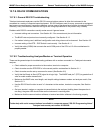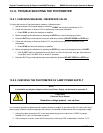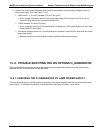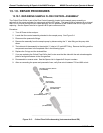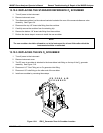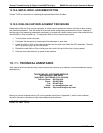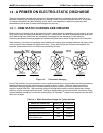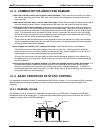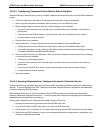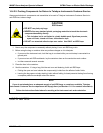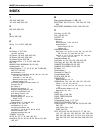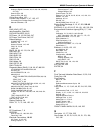
M400E Ozone Analyzer Operator’s Manual 347BA Primer on Electro-Static Discharge
14.3. COMMON MYTHS ABOUT ESD DAMAGE
I didn’t feel a shock so there was no electro-static discharge: The human nervous system isn’t able to
feel a static discharge of less than 3500 volts. Most devices are damaged by discharge levels much
lower than that.
I didn’t touch it so there was no electro-static discharge: Electro Static charges are fields whose lines of
force can extend several inches or sometimes even feet away from the surface bearing the charge.
It still works so there was no damage: Sometimes the damaged caused by electro-static discharge can
completely sever a circuit trace causing the device to fail immediately. More likely, the trace will be only
partially occluded by the damage causing degraded performance of the device or worse, weakening the
trace. This weakened circuit may seem to function fine for a short time, but even the very low voltage
and current levels of the device’s normal operating levels will eat away at the defect over time causing
the device to fail well before its designed lifetime is reached.
These latent failures are often the most costly since the failure of the equipment in which the damaged
device is installed causes down time, lost data, lost productivity, as well as possible failure and damage
to other pieces of equipment or property.
Static Charges can’t build up on a conductive surface: There are two errors in this statement.
Conductive devices can build static charges if they are not grounded. The charge will be equalized
across the entire device, but without access to earth ground, they are still trapped and can still build to
high enough levels to cause damage when they are discharged.
A charge can be induced onto the conductive surface and/or discharge triggered in the presence of a
charged field such as a large static charge clinging to the surface of a nylon jacket of someone walking
up to a workbench.
As long as my analyzer is properly installed, it is safe from damage caused by static discharges: It is
true that when properly installed the chassis ground of your analyzer is tied to earth ground and its
electronic components are prevented from building static electric charges themselves. This does not
prevent discharges from static fields built up on other things, like you and your clothing, from discharging
through the instrument and damaging it.
14.4. BASIC PRINCIPLES OF STATIC CONTROL
It is impossible to stop the creation of instantaneous static electric charges. It is not, however difficult to prevent
those charges from building to dangerous levels or prevent damage due to electro-static discharge from
occurring.
14.4.1. GENERAL RULES
Only handle or work on all electronic assemblies at a properly set up ESD station. Setting up an ESD safe
workstation need not be complicated. A protective mat properly tied to ground and a wrist strap are all that is
needed to create a basic anti-ESD workstation.
Wrist Str
a
Protective Mat
Ground Point
Figure 14-2: Basic anti-ESD Work Station
04315 Rev. C1 261



